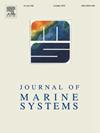北极海冰面积的减少是否会导致海底-远洋净交换方向的逆转?
IF 2.5
3区 地球科学
Q2 GEOSCIENCES, MULTIDISCIPLINARY
引用次数: 0
摘要
在北极,由于气候变化和极锋向北移动导致的海冰损失预计会影响许多生态系统过程,例如海底和水柱之间颗粒和溶解物质交换的生态重要过程。在这项研究中,我们首次表明,从一个冰覆盖的、以北极水为主的系统到一个以大西洋为主导的无冰系统的变化可能会逆转海底水交换的方向。在两年多的时间里,我们研究了横跨巴伦支海的南北样带,在不同的海冰覆盖条件下,记录了生物、生物地球化学、水文、地球物理和海洋学数据。在以大西洋为主导的环境中,与以北极水为主导的环境中存在的关键底-上层通量的方向和大小之间存在明显差异。目前,南巴伦支海表现出溶解物质的净下降通量和颗粒的净上升通量,而在北部地区,溶质向上波动,颗粒向下波动,使北部成为一个更沉积的地区,促进近地面初级生产力。应采用对快速变化的生态系统净通量的广泛评估来监测气候变化和人为活动的影响。本文章由计算机程序翻译,如有差异,请以英文原文为准。
Will the declining sea ice extent in the Arctic cause a reversal of net benthic-pelagic exchange directions?
In the Arctic, loss of sea ice due to climate change and the northward shift of the Polar Front are predicted to affect many ecosystem processes such as the ecologically important process of particulate and dissolved matter exchange between the seafloor and the water column. In this study, we show for the first time that a change from an ice-covered, Arctic water-dominated system to an Atlantic -dominated ice-free one is likely to reverse seafloor-water exchange directions. A north – south transect across the Barents Sea was studied over two years with differing sea ice cover conditions, recording biological, biogeochemical, hydrographic, geophysical, and oceanographic data. There was a clear difference between the direction and magnitude of key benthic-pelagic fluxes present at Atlantic-dominated environments, and those in Arctic water – dominated ones. Currently, the southern Barents Sea exhibits a net downward flux of dissolved matter and a net upward flux of particulates, while in the northern region solutes fluctuate upwards and particulates downward, making the North a more depositional region that promotes near-surface primary productivity. Broad scale assessments of net fluxes in rapidly changing ecosystems should be employed to monitor impacts of climate change and anthropogenic activities.
求助全文
通过发布文献求助,成功后即可免费获取论文全文。
去求助
来源期刊

Journal of Marine Systems
地学-地球科学综合
CiteScore
6.20
自引率
3.60%
发文量
81
审稿时长
6 months
期刊介绍:
The Journal of Marine Systems provides a medium for interdisciplinary exchange between physical, chemical and biological oceanographers and marine geologists. The journal welcomes original research papers and review articles. Preference will be given to interdisciplinary approaches to marine systems.
 求助内容:
求助内容: 应助结果提醒方式:
应助结果提醒方式:


